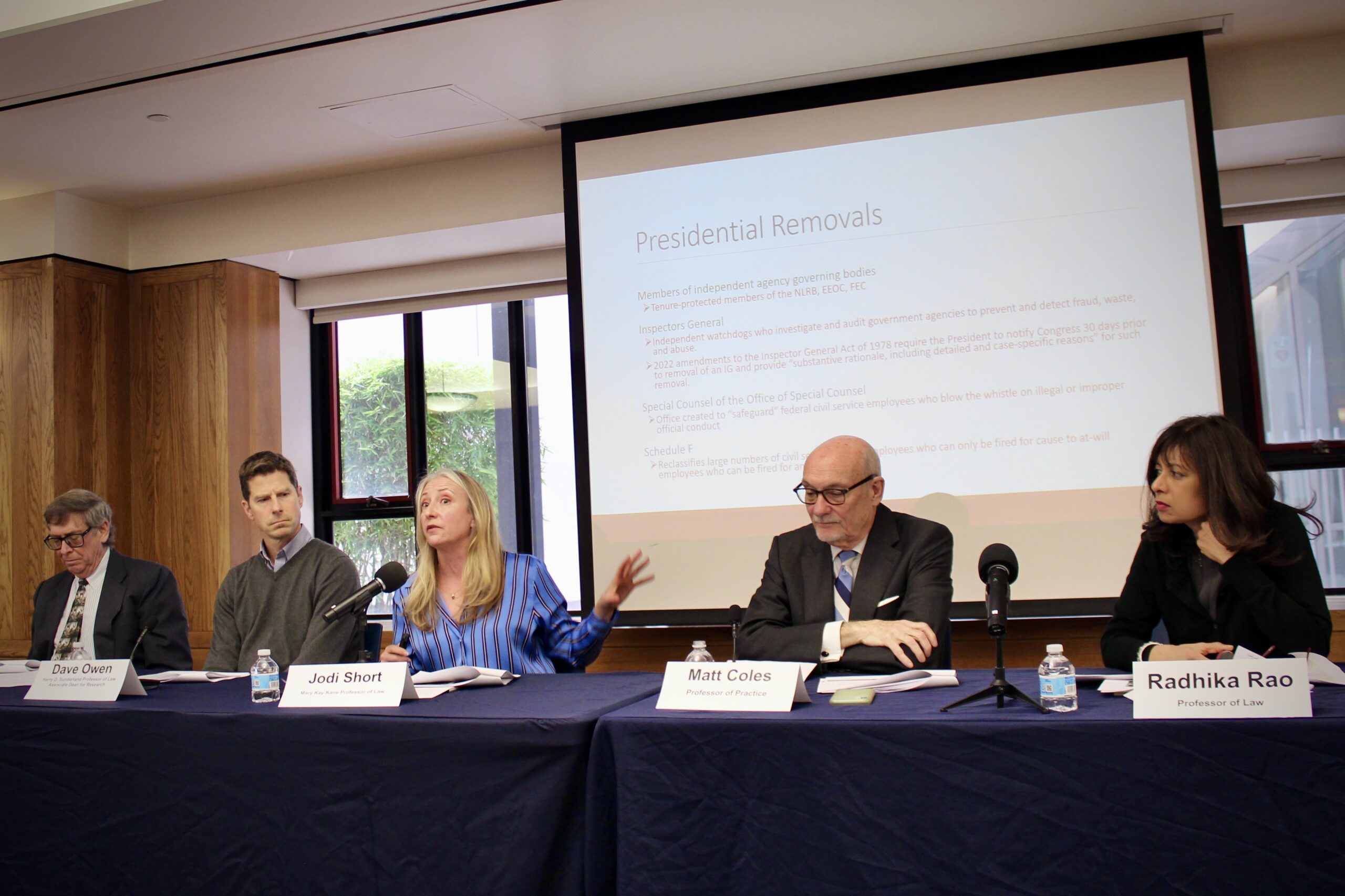UC Law SF Experts Examine Legal Limits of Trump’s Sweeping Executive Orders

Professors Rory Little, Dave Owen, Jodi Short, Matt Coles, and Radhika Rao analyze the constitutional limits of presidential power and legal questions surrounding new executive orders during a recent panel discussion at UC Law San Francisco.
Freezing federal funding. Shutting down government agencies. Laying off masses of federal workers. Firing independent inspectors general. These are just a few of President Donald Trump’s sweeping actions in his first weeks in office, sparking debate over the limits of executive power.
In February, a group of UC Law San Francisco’s constitutional law experts convened to analyze the president’s recent executive actions and their legal implications. Trump signed more than 70 executive orders in his first 30 days, including a record 26 on his first day in office.
“These orders are extraordinary, not just in their number, but in their breadth,” said Rory Little, a professor of criminal and constitutional law at UC Law SF. “The current state of affairs can be characterized I think with no exaggeration as a crisis, a challenge to the rule of the law in the United States.”
Little was joined by faculty members Matt Coles, Radhika Rao, Jodi Short, and Dave Owen, associate dean for research. Owen explained that while presidents can issue executive orders within the scope of powers delegated by Congress, they cannot override laws, direct agencies to act unlawfully, or dictate how state and local governments must act.
“There are many provisions in the executive orders that purport to do some or all of these things,” Owen said. “The challenge for the courts—and for us—is to parse through the orders and decide what is allowable and what is not.”
Coles discussed the federal government’s spending power, which is controlled by Congress. He pointed to the Impoundment Control Act of 1974, which restricts the president’s ability to withhold funds authorized by Congress, and the Supreme Court’s 1998 ruling striking down a presidential line-item veto enacted by lawmakers.
“If that congressionally authorized recission of some appropriations was unconstitutional, an unfettered presidential power is absolutely unconstitutional,” Coles said.
Rao examined the rhetoric of Trump’s executive orders, calling their titles “Orwellian.” She cited examples such as “Defending Women from Gender Ideology Extremism” and “Ending Radical Indoctrination in K-12 Schooling.” She also noted the administration’s attempts to coerce local and state governments by threatening to withhold federal funding from institutions that support transgender rights.
“This is a coercive use of federal power to intrude into areas traditionally governed by state and local law,” she said.
More than 90 lawsuits have been filed across the country challenging the recent executive actions, including the creation of a new Department of Government Efficiency (DOGE), a cost-cutting agency led by tech billionaire Elon Musk. Short pointed out that DOGE lacks congressional authorization, making it legally dubious. The executive order creating DOGE granted it broad access to agency records and the authority to influence staffing decisions across the executive branch.
“The president may not create offices for himself to fill,” Short said, referencing Justice Clarence Thomas’s concurring opinion in Trump v. United States, where he argued that unauthorized offices, such as the special counsel appointed to prosecute Trump, cannot be lawfully occupied.
Short said that such moves appear designed to expand executive power, erode democratic institutions, and weaken accountability mechanisms.
“While some may legitimately applaud the policy goals that underlie some of these actions, I hope we can all agree these policy goals should be pursued lawfully, lest we end up living in the type of system envisioned by the president, where he is the only law,” Short said.
As legal challenges to executive actions continue to unfold, UC Law SF scholars play a key role in fostering a deeper understanding of executive power and its constitutional boundaries. Their insights help shape informed debate on how government authority should be exercised within the rule of law.